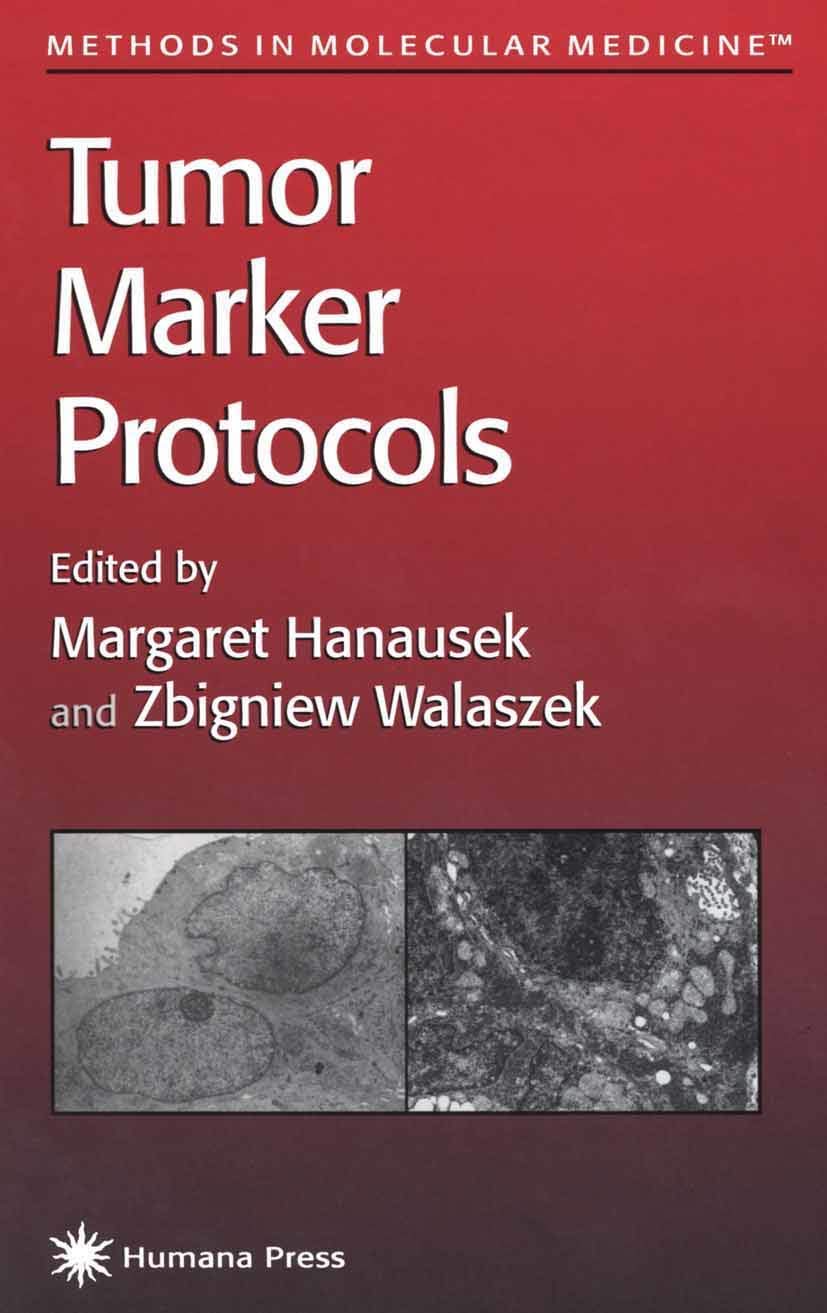
Title

Tumor Marker Protocols (Methods in Molecular Medicine, 14),New
Delivery time: 8-12 business days (International)
The development of cancer is a slow process and it very often takes a number of years before a tumor becomes clinically evident. No current te nique is sensitive and specific enough to detect tumors at their earliest stage, i. e. , when the tumor is smaller than one billion cells. Consequently, the d ease is usually diagnosed in an advanced state, very often when it is already beyond the reach of therapeutic strategies. This is the main stumbling block to the secondary prevention that would reduce cancer mortality. There is hope, however, because in the last decade we have witnessed an explosion of reports dealing with tumor markers. In many instances, simple, noninvasive diagnostic tests are becoming available to detect the early signs ofneoplasia. Interest in early detection of neoplasia is growing among those basic scientists, cli cians, and health professionals who realize that progress in reducing cancer mortality is dependent to a great degree on its early detection and prevention. Some disappointment usually accompanies these discoveries, because what at first glance proves to be promising, is in many instances, applicable only to a limited number of cases. What is the cause of these failures? The answer may be that cancer is a multitude of neoplastic diseases in which endogenous and exogenous etiologic factors contribute either sim taneously or over a lifetime to the development of disease.
By changing our most important processes and
products, we have already made a big leap forward. This ranges from the
increased use of more sustainable fibers to the use of more
environmentally friendly printing processes to the development of
efficient waste management in our value chain.
⚠️ WARNING (California Proposition 65):
This product may contain chemicals known to the State of California to cause cancer, birth defects, or other reproductive harm.
For more information, please visit www.P65Warnings.ca.gov.
Shipping & Returns
Shipping
We ship your order within 2–3 business days for USA deliveries and 5–8 business days for international shipments. Once your package has been dispatched from our warehouse, you'll receive an email confirmation with a tracking number, allowing you to track the status of your delivery.
Returns
To facilitate a smooth return process, a Return Authorization (RA) Number is required for all returns. Returns without a valid RA number will be declined and may incur additional fees. You can request an RA number within 15 days of the original delivery date. For more details, please refer to our Return & Refund Policy page.
Shipping & Returns
Shipping
We ship your order within 2–3 business days for USA deliveries and 5–8 business days for international shipments. Once your package has been dispatched from our warehouse, you'll receive an email confirmation with a tracking number, allowing you to track the status of your delivery.
Returns
To facilitate a smooth return process, a Return Authorization (RA) Number is required for all returns. Returns without a valid RA number will be declined and may incur additional fees. You can request an RA number within 15 days of the original delivery date. For more details, please refer to our Return & Refund Policy page.
Warranty
We provide a 2-year limited warranty, from the date of purchase for all our products.
If you believe you have received a defective product, or are experiencing any problems with your product, please contact us.
This warranty strictly does not cover damages that arose from negligence, misuse, wear and tear, or not in accordance with product instructions (dropping the product, etc.).
Warranty
We provide a 2-year limited warranty, from the date of purchase for all our products.
If you believe you have received a defective product, or are experiencing any problems with your product, please contact us.
This warranty strictly does not cover damages that arose from negligence, misuse, wear and tear, or not in accordance with product instructions (dropping the product, etc.).
Secure Payment
Your payment information is processed securely. We do not store credit card details nor have access to your credit card information.
We accept payments with :
Visa, MasterCard, American Express, Paypal, Shopify Payments, Shop Pay and more.
Secure Payment
Your payment information is processed securely. We do not store credit card details nor have access to your credit card information.
We accept payments with :
Visa, MasterCard, American Express, Paypal, Shopify Payments, Shop Pay and more.
Related Products
You may also like
Frequently Asked Questions
- Q: What is the main focus of 'Tumor Marker Protocols'? A: The book focuses on the development and early detection of cancer through tumor markers, highlighting the importance of identifying tumors at their earliest stages.
- Q: Who is the author of 'Tumor Marker Protocols'? A: The author of 'Tumor Marker Protocols' is Margaret Hanausek.
- Q: What is the publication date of this book? A: The book was published on November 9, 2010.
- Q: What topics are covered in 'Tumor Marker Protocols'? A: The book covers various tumor markers, their diagnostic applications, and the challenges associated with early detection of neoplasia.
- Q: Is 'Tumor Marker Protocols' suitable for healthcare professionals? A: Yes, the book is suitable for healthcare professionals, basic scientists, and clinicians interested in cancer research and prevention.
- Q: What is the binding type of this book? A: 'Tumor Marker Protocols' is available in a paperback binding.
- Q: How many pages does 'Tumor Marker Protocols' have? A: The book contains a total of 514 pages.
- Q: What edition of 'Tumor Marker Protocols' is available? A: This is a softcover reprint of the hardcover first edition published in 1998.
- Q: Does the book provide practical diagnostic tests for tumor markers? A: Yes, the book discusses noninvasive diagnostic tests that are becoming available for the early detection of tumors.
- Q: What category does 'Tumor Marker Protocols' fall under? A: 'Tumor Marker Protocols' is categorized under Oncology.
